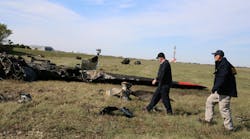Washington, DC, March 24, 2015 – National Business Aviation Association (NBAA) President and CEO Ed Bolen today set forth the business aviation community’s top priorities as Congress begins work on crafting legislation for “reauthorization," or funding and governance of the Federal Aviation Administration (FAA).
In written testimony submitted to the U.S. House of Representatives Transportation & Infrastructure Committee’s Subcommittee on Aviation, Bolen outlined nine “guiding principles” NBAA and its Members consider fundamental for ensuring that proposals offered in conjunction with FAA reauthorization support business aviation, which helps generate over a million American jobs and more than $200 million in economic activity each year.
Bolen’s testimony was put forward as part of an Aviation Subcommittee hearing focused on FAA reauthorization, and aviation system modernization, titled, ““Options for FAA Air Traffic Control Reform.” View Bolen’s testimony submitted to the House Aviation Subcommittee in its entirety.
“The U.S. today has the best air transportation system in the world, but in order for us to be able to make that statement a decade from now, changes will be necessary,” Bolen’s testimony states. “How we accomplish those changes is at the heart of the reauthorization debate. NBAA and its Members are committed to the changes needed to make NextGen a reality, but we will not support changes that fail to preserve business aviation’s access to airspace and airports in a safe, predictable and affordable manner. The debate over how to get from where we are to where we want to go is one NBAA believes should be undertaken in the context of data, facts and guiding principles.”
Bolen outlined those guiding principles as follows:
- Make NextGen a reality. The business aviation community supports a continuing transition to a Next Generation, or “NextGen” aviation system, but recognizes that the transition will continue to be met with significant challenges, and for America to retain its world-leadership position in aviation, change will be necessary. “Make no mistake about it: no one is content with the clarity, pace or cost of the transition to NextGen to date,” Bolen’s testimony notes. “We need to do better.”
- Keep congressional control over taxes, fees and charges. In the FAA reauthorization debate, proposals are being offered that would put authority over the aviation system in the hands of structures consisting of non-elected officials. While a dialogue about finding a new governance structure is appropriate, the composition and scope of its authority remains a critical consideration. Congress must retain authority over taxes, fees and charges.
- No user fees. All of general aviation, including business aviation, pays for its use of the aviation system through a fuel tax, which is the most efficient, effective payment system. Congress has repeatedly written to current and former White House administrations in opposition to per-flight user fees, and should continue to oppose them.
- Ensure predictable, affordable access to airspace and airports. The inherent value of business aviation is the ability of companies to fly where they need to, when they need to. Business aviation must have continued access to the nation’s airports and airspace.
- Protect the privacy of those in flight. The Automatic Dependent Surveillance–Broadcast (ADS-B) technology, a cornerstone of the FAA’s satellite-based NextGen system, does not currently include needed protections for operators’ privacy and security. Congress has agreed with NBAA that people should not have to surrender their privacy and security just because they travel on a general aviation aircraft. In past FAA reauthorization measures, Congress has included language requiring the FAA to provide an “opt-out” for those who do not want their aviation movements broadcast in real time, and lawmakers need to address this issue in the pending 2015 FAA reauthorization bill.
- Protect the nation’s airport system. In some parts of the country, attempts are being made to close important airports. NBAA supports giving the Secretary of Transportation sufficient discretion to allow an airport to remain open for the purposes of protecting or advancing the civil aviation interests of the United States, if standard conditions become unenforceable.
- Improve the certification and approval process. The approval process for new aviation technologies and other products can be cumbersome, unnecessarily taking up time and resources. The FAA should constantly look for ways to keep or improve safety, while adopting more efficient, effective business-like processes.
- Ensure the safe introduction and integration of new aviation technologies. NBAA urges Congress to work closely with the Department of Transportation, FAA and the unmanned aircraft system (UAS) industry to integrate UAS into the national airspace system in a thoughtful, deliberative process focused safety and security.
- Ensure continuity of government aviation services. Aviation aircraft and parts cannot be produced, financed, bought or sold without the written approval of the federal government. NBAA urges lawmakers to include language in FAA reauthorization legislation to ensure that the important aviation safety and security functions of the FAA Registry Office are protected from future government shutdowns.
“Ensuring that America continues to lead the world in all aspects of aviation is clearly in our country’s best interest, and should be a national priority,” Bolen’s testimony states. “NBAA is fully committed to the work being done to transition to a NextGen system.”
Bolen added that achieving the goals for system modernization, and ensuring that the interests of all aviation stakeholders, including business aviation, are given priority by Congress “is the way to ensure that America’s aviation system remains the world’s leader, not the follower – whether that be five years, 10 years or 30 years from now.”
Founded in 1947 and based in Washington, DC, the National Business Aviation Association (NBAA) is the leading organization for companies that rely on general aviation aircraft to help make their businesses more efficient, productive and successful. The Association represents more than 10,000 companies and provides more than 100 products and services to the business aviation community, including the NBAA Business Aviation Convention & Exhibition, the world's largest civil aviation trade show. Learn more about NBAA at www.nbaa.org.




